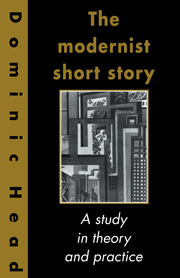Book contents
- Frontmatter
- Contents
- Preface
- Acknowledgements
- 1 The short story: theories and definitions
- 2 James Joyce: the non-epiphany principle
- 3 Virginia Woolf: experiments in genre
- 4 Katherine Mansfield: the impersonal short story
- 5 Wyndham Lewis: the Vorticist short story
- 6 Malcolm Lowry: expanding circles
- 7 Conclusion: contemporary issues
- Notes
- Bibliography
- Index
3 - Virginia Woolf: experiments in genre
Published online by Cambridge University Press: 06 July 2010
- Frontmatter
- Contents
- Preface
- Acknowledgements
- 1 The short story: theories and definitions
- 2 James Joyce: the non-epiphany principle
- 3 Virginia Woolf: experiments in genre
- 4 Katherine Mansfield: the impersonal short story
- 5 Wyndham Lewis: the Vorticist short story
- 6 Malcolm Lowry: expanding circles
- 7 Conclusion: contemporary issues
- Notes
- Bibliography
- Index
Summary
In the opening chapter a recurring distinction between two types of story was discussed, a distinction epitomized in Eileen Baldeshwiler's article ‘The Lyric Short Story’. Baldeshwiler perceives a clear division between the conventional, plot-based story (‘epical’) and the ‘lyrical’ story, often open-ended, which focuses upon ‘internal changes, moods, and feelings’. The value and ultimate limitation of this binary approach can be clearly demonstrated through an analysis of the Woolfian short story. For the student of modernism it is Baldeshwiler's historicizing of the lyrical story's development that is most significant: the ‘lyricism’ she discerns in Katherine Mansfield and Virginia Woolf is accurately defined as an integral part of their innovative use of the short story form. Yet it is in this area that Baldeshwiler overstates her case, claiming that Woolf ‘definitively abandoned the conventional short story to choose new subjects, new themes, new structures, and new language’. The implicit parallel between modernist experimentation and the development of the genre is helpful, but the notion of a definitive abandonment of a literary heritage is plainly wrong: from what follows below it will be clear that Woolf never did finally abandon the conventional short story, and that her experiments in the genre depend upon the adaptation, often the subversion, of existing forms and conventions. This, then, is a fair summary of the Woolfian story, continually reacting against, revolving around, conventional story types, yet never finally abandoning the touchstone of its literary heritage.
- Type
- Chapter
- Information
- The Modernist Short StoryA Study in Theory and Practice, pp. 79 - 108Publisher: Cambridge University PressPrint publication year: 1992



